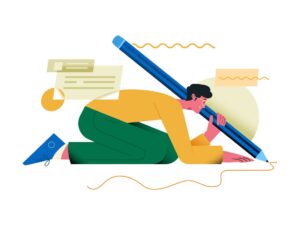11 tricky word pairs that can confuse writers
They might sound similar or have a closely-related spelling, but don’t make the mistake of thinking these words are interchangeable.

The English language is full of befuddling word pairs. Here are 11 sets that can cause trouble—even for the most experienced writers and editors. (Definitions and usage guidance from Lexico and Merriam-Webster.)
1. Adverse and averse
Adverse means unfavorable or harmful.
- Report any adverse effects from the drug to your physician.
Averse means opposed or strong disliking.
- He was averse to the idea of using a new tool for our online meetings.
2. Biannual and biennial
A biannual event occurs twice per year.
- Our financials are published biannually in March and October.
A biennial event takes place every two years.
- The state legislature meets biennially, during odd-numbered years.
3. Clamor and clamber
Clamor is a loud, continuous noise, or a loud or strong demand.
- We’ve been clamoring for a better expense reporting software for years.
Clamber means to crawl or climb in an awkward or clumsy way.
- Once the bar closed, Douglas clambered into a pedicab.
4. Cord and chord
A cord refers to a rope or a bond, an insulated electrical cable, or an anatomical structure.
- I need a power cord to continue working on my laptop.
- She suffered a vocal cord injury and could no longer sing.
A chord is a musical term for a combination of three or more musical notes played together. Chord can also refer to an emotional feeling or response.
- Mastering chord changes on a piano takes dexterity and practice.
- Amy’s story struck a sympathetic chord with her audience.
5. Dosage vs. dose
Dosage is the amount of medicine to be taken by a patient during a period of time.
- The dosage is three times per day for 30 days.
Dose is the amount taken at one time.
- The mornings dose is 250 mg and the evening dose is 150 mg.
6. Drag and drug
Drag/dragged is a transitive verb and has a direct object, which is the thing or person that is being pulled along by force.
- We dragged the boat to the other side of the lake.
Drug, drugged means to “administer drugs to.” It is not the past tense of the verb “drag.”
- We drugged the cat before taking her in the car.
7. Farther and further
Farther refers to the actual physical distance between objects.
- My new house is farther from the office.
Further refers to figurative distances or something that is additional or more
- How can we use social media to further our cause?
I was further annoyed when my laptop crashed.
Tip: If you can’t replace further with additional or more in a sentence, you are probably using it incorrectly.
8. Hanged and hung
Hang has two forms, depending on whether a person or object is receiving the action.
- Hang, hung refers to objects.
- Steve hung the picture upside down.
- I hung up that shirt so it wouldn’t get wrinkled.
Hang, hanged refers to executions or suicides.
- They hanged criminals in the town square.
A grim mnemonic aid for this: Pictures are hung and people are hanged.
9. Lightening and lightning
Lightening is not the same thing as lightning. Lightening means to illuminate or to make something lighter or clear. It can also mean to relieve a burden or reduce weight.
- Can you lighten that image in Photoshop?
- Once the new content management system is installed, it will lighten our workload considerably.
Lightning occurs during thunderstorms.
- Our olive tree was destroyed by lightning during last night’s storm.
10. Regime and regimen
A regime is a form of government, social system, or a period of rule.
- Animal Farm is an allegorical tale of the Communist regime in the early days of the Soviet Union.
Regimen is a systematic schedule (such as exercise or medication) designed to improve or maintain health.
- The cardiologist prescribed a three-drug regimen to treat her high cholesterol.
11. Seasonable and seasonal
Seasonable means in keeping with the time or the season; suitable for a particular time of year.
- We’ve been enjoying very seasonable weather.
Seasonal is related to or dependent on a particular season.
- Most students at the high school have seasonal jobs as lifeguards.
- The custard recipe calls for seasonal fruit as a garnish.
What word combinations would you add to this list?






